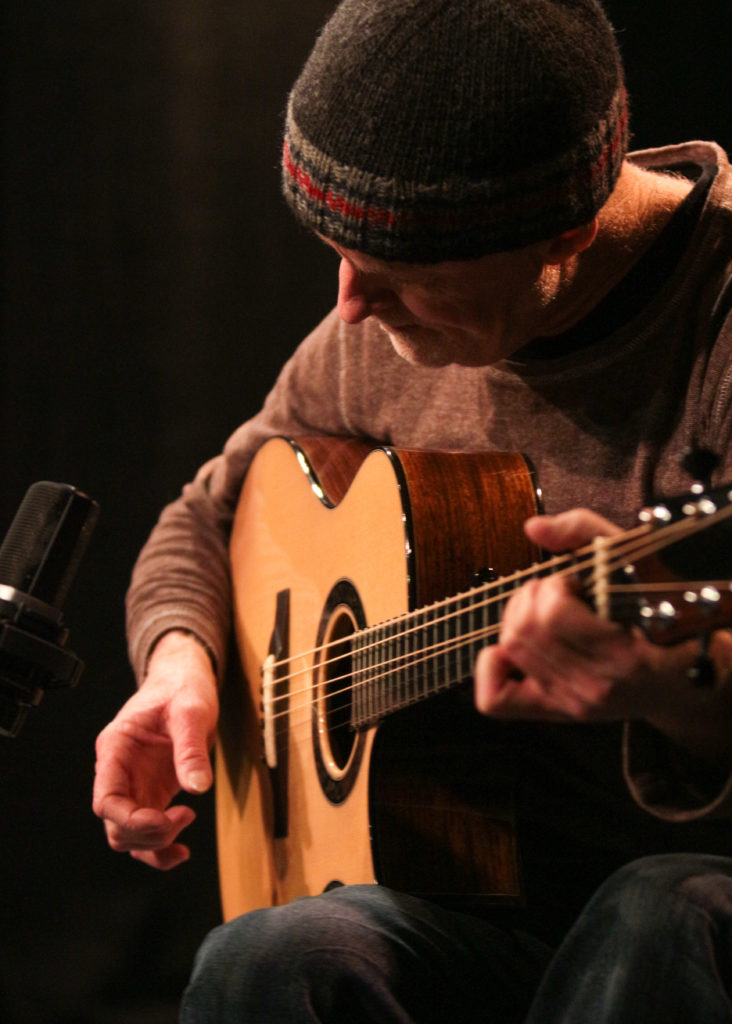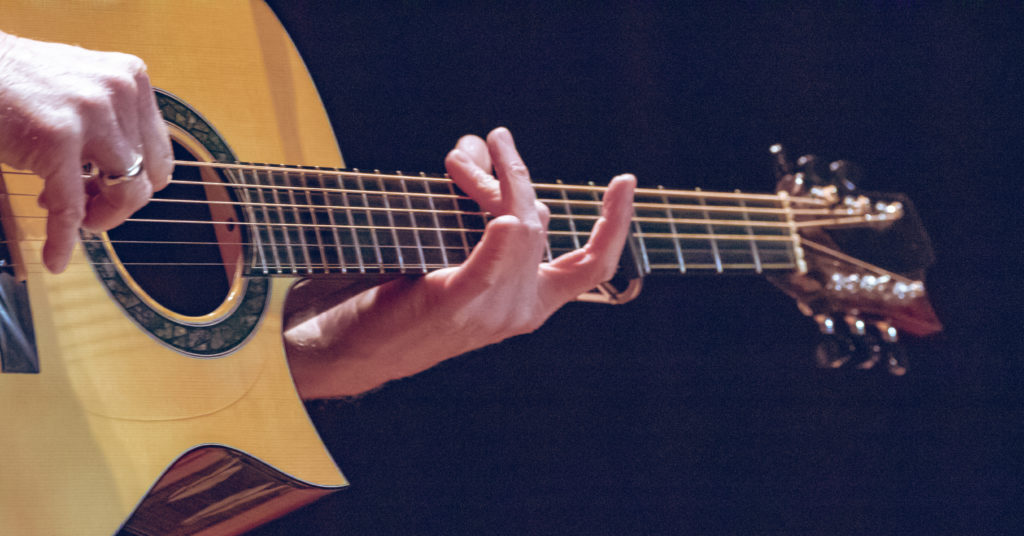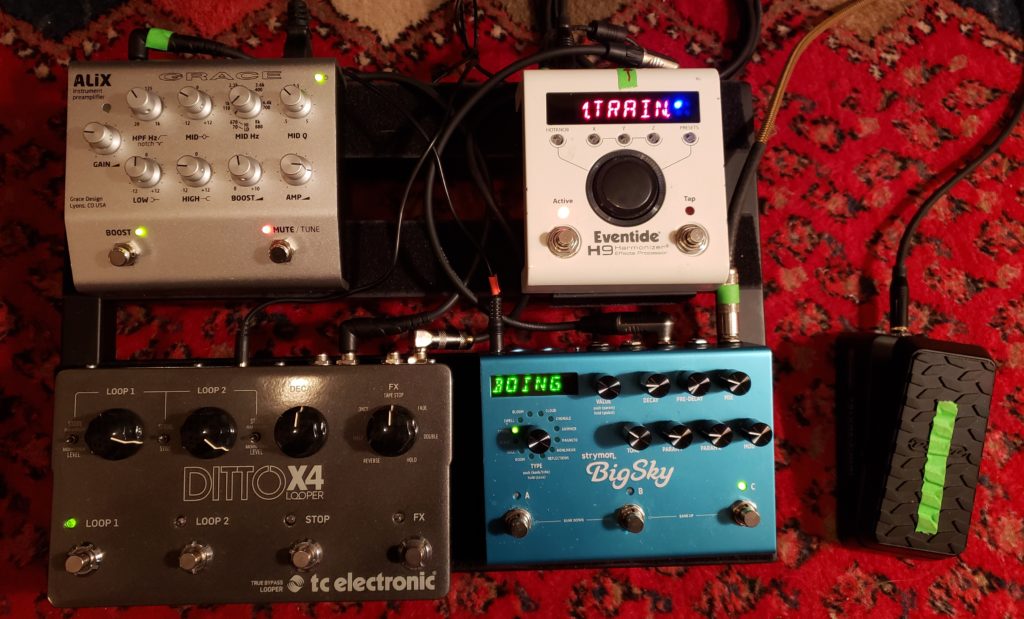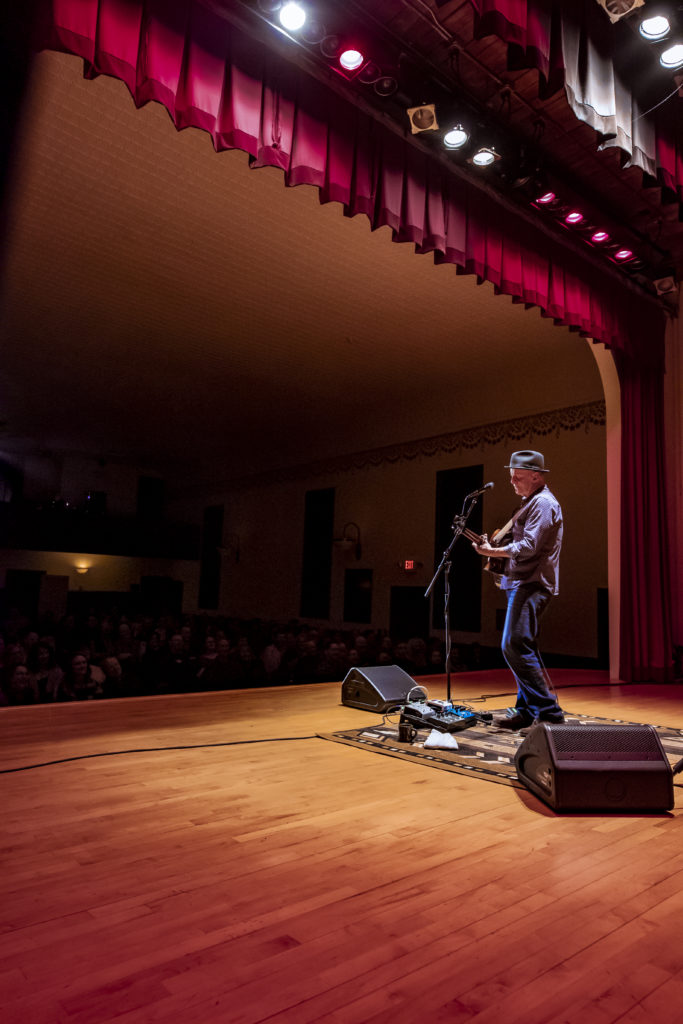Willy Porter
Milwaukee, WI
willyporter.com
This is a pretty special interview – as some of you may know, I hail from the great city of Milwaukee, Wisconsin, and I had the pleasure of seeing Willy play numerous times, in high school and beyond, before I moved away. It was a real treat to have been able to sit down with him here in Asheville and talk about music, Mil-town and life in general. Hope you all enjoy it as much as I did… Mike
Pedal of the Day: Well, first of all, how’d you get started playing? Who were your big influences when you were getting going?
Willy Porter: My father was a piano player, so I grew up in a house with a fair amount of music, and I have older brothers and older sisters who had great record collections, so it really started out with, you know, Slade and Pink Floyd and we had the first Queen record, first Styx record, you know. Neil Young hit, I discovered him, and then certainly Joni Mitchell and Jeff Beck, The Yardbirds, all that stuff. I just dug into everything. Got into Dylan as a kid and so, I don’t know – I’d love to point out stuff specifically, but I just love all music.
POTD: When did you start picking guitar?
WP: About 12, I guess. We got this first beater, nylon string thing, and I took lessons for a year from this woman who was a really great folk singer, and had some great, basic fingerstyle techniques she showed me. Her thing was really about songs, you know: “I know you’re a 12 year old boy, but I’m going to get you to sing.” Lo and behold, she did and I, you know, begrudgingly I gave it a go. She had this love for what a song was and it didn’t all make a lot of sense to me until later on.
POTD: You play in a lot of crazy tunings. How did you discover those and how do you write a song? How do you pick what tunings you’re going to use, and have you made up your own tunings? Are they mostly just offbeat, but things that people can figure it out?
WP: The short answer is when you’re playing the records, you put a vinyl record on, a lot of times engineers would speed up or slow down the tracks, so they’re not tuned to pitch. And that was an early discovery for me because I would try to tune my guitar so that it would match the tonality of what I was listening to. By doing that, I realize now that I was doing some really early ear training, and that helped me sort of figure things out, musically. But in terms of guitar, it also helped me realize that, you know, this thing doesn’t have to be tuned the way everyone says it should be, and that just opened all these doors and led me down different open intervals and things. And listening to Joni Mitchell, I knew she wasn’t tuned to standard pitch, because I could play a C chord on the guitar, but when she played a C, it sounded so different. You know, it’s this big, lush, open, resonant tone. That’s what really opened my ears, too.
So it was really by listening and trying to figure out how to make the guitar work more effectively. Over time, as I started playing solo in bars, I realized that if the guitar is standard tuned, I don’t have any bass, there’s no low end on the instrument. I was really tasked with trying to sell beer, and in these bars, your music was judged on your ability to sell beer, and not on the quality of the art. Being from beer town, Milwaukee, I figured it out. So I would tune everything down a half step. That helped. But then, if I went to say, an open D Flat tuning, all of a sudden it’s like wow, there’s all this bass down here. When you suddenly have control of the bass register, you can get people to dance, you can make things happen. And that just started a whole ‘nother cascade.
POTD: I saw a video of you on YouTube, you were playing a guitar that had the bottom three regular strings, but then you had a 12-string configuration on the high three. So you had nine strings, right?
WP: Yes.
POTD: So you tune the strings down to get more bass, and then have a 12-string kind of pop at the high end?
WP: Well, that idea came up from playing a gig where I grabbed a guitar that I thought was a six string, and I went up to this festival in Wisconsin, and when I got there, I realized I grabbed the twelve string and I thought, how am I going to get through the show? Because it’s an hour and 20 minute set, and I changed tuning a lot. On a six string, you tell stories and do stuff, but on the twelve string that’s a mountainous job, so I just pulled the three octave strings off the low side. Then all of a sudden it was like, I can get through this gig. Well, I realized right away then that for some of the open tuned stuff, in order to get the intonation right, if I had a baritone scale length guitar, this would really be a neat thing to have. So I commissioned the guitar from Gordy Bischoff in Eau Claire, Wisconsin, and that became this 9-string baritone you’re talking about. So that is a long scale guitar that can accommodate the lower tones, and intonate properly, but it also has that unwound octave string in what is the D string position on a guitar normally. That’s an amazing instrument, because you have this wide range of tones that cover a broad range of the audio spectrum, it’s a fun thing. I don’t do a lot of slap-based stuff. I do some string stopping stuff, but I’m using it more in a Travis style, do some tapping with it, but it’s really rudimentary stuff. The majority of what I’m doing is definitely more Travis, and stolen from Leo Kottke. He’s awesome.
POTD: I first saw you in ’93 or ’94, I can’t remember if it was right before or right after Dog Eared Dream came out. It was in an auditorium at Marquette University. Just wanted to know about the success of that album, because it came out and all of a sudden you’re kind of everywhere. Was it a gradual thing, or did it come overnight, and was that welcomed or were you kind of taken aback by it?
WP: The success of that record was something we worked really hard for. I had a great record label called Don’t Records in Milwaukee. Those guys hired a great radio promotions person named Paulette McCubbin, and she did a fantastic job of getting that record out in the world. I think, if anything, we were shocked that it was successful, but we worked really hard to get the music out there. That just led to more stuff, and it was a good band – I was very fortunate to have a great band.
POTD: You were playing with (John) Calarco and Biff (Blumfumgagnge) and Steve Kleiber. And then Greg Koch was playing with you at that time or maybe a little bit after, right?
WP: Yeah, he was after that record came out, and unfortunately Greg wasn’t on it. We toured and we were lucky to sort of pick up Greg, and he and Steve and John, I mean everybody just melded in that band, in a great way. It was a really selfless time. Everyone was really hungry and committed to the music, and it’s hard to replicate that sort of energy.
POTD: I know you’re doing more solo kind of stuff, but do you ever think about returning to full band set up like that?
WP: I do, absolutely. Ironically, that band reconvened to do the re-release of Dog Eared Dream, so we did a 25th anniversary thing, and it was everybody excluding Steve (who passed away in 2014) who all got together and played a series of shows, and that was great. It was great energy. I have currently a different rhythm section that I’ve been playing with for quite a while, as well as a great guitar player named Ryan Pearl, who plays with me, and Carmen (Nickerson) is in the band as well. So, yeah, I think the only original band member from that era is Dave Adler, the piano player, who stayed with me through the whole ride. We’re getting ready to record another record together soon.
POTD: After the success of that album, you got to play with people all over the world, opening for or collaborating with, tons of famous people and bands. Any one or a couple of people you’ve gotten to play with that you were really inspired, or maybe awestruck, by?
WP: I’m grateful to all of them, certainly, but I think Tori Amos is a really singular and wonderful human being. She’s just such an absolute genius. I got to spend time with her, and being in her camp for quite a period of time, I guess in 1996/97, that was life changing for me, from the standpoint of how much she invests in the spell of the song, and how she delivers what she does. I got to hang out with Sting a little bit. I got to play with and hang out with Paul Simon a little bit. I mean, those people were all really gracious. Certainly Jeff Beck, that was a great tour. The Jethro Tull guys were really, really kind to me. You know that saying, “the heaviest dudes are light as a feather?” It’s really true.
POTD: The song “Loose Gravel” always stood out to me when I first started seeing you, because of the line about (Milwaukee Brewer first baseman) Cecil Cooper – your lyrics seem to have kind of personal messages and kind of a personal overtone. Where do you come up with the lyrics? I mean, is that story true for example, about, about helping the kid up with his bike?
WP: You know, that whole story is pretty much factual. My friend John Smith, who’s another Wisconsin songwriter, I started telling him the story and we started to write it through, and he said it was such a good story about being a kid and taking risks. At the end, I did add that last verse to sort of bring it home. That was not a factual thing.
POTD: But did you really eat it on a bike?
WP: I did, but the name of the place was really the Fudge Pump, at the Bayside Shopping Center. But I stacked it really hard, and I went in and people were cheering. They applauded when I came in, and it was easily one of the most embarrassing moments in my life, but highly formative (laughs).
POTD: So back to that – do you draw a lot from personal experience, or are a lot of the lyrics sort of made up?
WP: I do. I feel like if I don’t do that, it’s really hard for me to find a place in the song. And if you’re going to sing the song over and over, you know, there needs to be stuff that resonates with your own sensory experience. Whether it’s food or our sense of place or the narrator’s voice, all that stuff is meaningful to me. Not everything I write is factual or based on my life, of course, but I try to invest enough that, on repeated offerings of it, I’m still able to find my place in that room.
POTD: Since I’m doing this for a Pedal of the Day…I know you’re mostly just acoustic, but you have a couple of things on stage, pedal-wise. Can you tell me about that?
WP: Right now I’d say my favorite piece in my rig is a Grace Design ALiX, which is basically a studio quality mic preamp, but it’s been configured to handle acoustic instruments. They’re making amazing stuff, and I’m just big fan of the sound that I get out of it, because it’s what I’ve been working on for years, and carrying a rack with me to achieve what this is doing in a floor pedal. So that piece is fabulous. I also have an Eventide H9, which I think is a great, fantastic piece. It’s such a great pedal, and I use that combined with a (Strymon) Big Sky. So those are the elements that I really love the most. But I’d have to say the most important of the three for the sound I’m going for is definitely the Grace.
POTD: And what about guitars? Is the baritone is out on tour with you or do you just use it sporadically?
WP: I do, but on this run, because I just came down for two shows, I’m just bringing the Jason Kostal Custom MD. I have just one of his guitars on the road with me now, just a basic 6-string – it’s just an extraordinary guitar. You know, I’d say he’s at the height of acoustic guitar building. Jason’s got to be in the top five in the world right now, in terms of his instruments and how they play. I know a lot of people make a great guitar, but you can’t play it up the neck, the intonation isn’t there, or you get a lot of hand fatigue because the string spacing is not right. He’s got the radius and, everything’s just right on this guitar, it’s absolutely in agreement with itself.
POTD: I’m sure that helps with you because you play all kind of all over the neck. Kinda need to have an instrument that’s comfortable everywhere.
WP: It’s just a great feeling guitar. And it’s very rewarding and challenging at the same time. It’s like….I want to work on more guitar music with it. You know, after you’ve been doing this a while, you need inspiration sometimes.
POTD: Does it have anything special or custom about it?
WP: The electronics are all Fishman. I’ve worked with them for years and they do an amazing job. It does have a K&K in it as well, that I use to blend together on occasion to get a little bit more wood tone to the piezo pickup. In larger venues that can be a little problematic, because of feedback and so forth. But again, the Grace has an amazing, very tight Q on the low end cut, so I’m able to really go in and actually cut out any problematic frequencies with a lot of precision. So the combination of these elements is great. I find that with pedals, I’m trying to do the minimal amount to the core sound that I’m sending through, because I really want to hear the guitar, I don’t want to hear the effect.
POTD: And, speaking of that, do you plug into right into the soundboard at the venues?
WP: Yeah. I actually have some of those QSC K12s, that I’ll use those as my amplifiers onstage if I’m doing a larger stage show with a band. I’ll do a stereo array of those it’s a house concert or something smaller, I’ll bring those and a sub, but for the majority of touring I use all the house stuff, yeah.
POTD: Nice. So, the solo shows like the one last night and tonight, do you enjoy the solo-ness of it, being on the road by yourself and just kind of driving and clearing your head, as opposed to going with a full band or with Carmen? Do you like the balance that you get between those two, or is there one you prefer over the other?
WP: I think I probably have the most experience being on my own, so in some ways that’s like putting on your old baseball mitt – it just fits, it feels right. And that’s very cool. So for me, there’s a comfort there of being by myself that I can do whatever I want, I can play the guitar anyway I want to play. If I wipe out, it’s all on me, there’s nowhere to hide, and I love that. I love playing with Carmen because we have this musicianship accountability and the comradery and the friendship and this mutual love and respect for the music, that really….on a great night with us, I feel like one plus one equals three, like we’re able to channel something. And I love the band, too – it’s a totally different level of communication, and I get to play completely differently. So, I’m grateful for all of these iterations, you know.
POTD: Do you ever invite your family to come along?
WP: My daughter’s been touring with me, so….she’s not on this run, but she’s a really pretty good singer and she sits in with me, and I’m really proud of her. We did the west coast at the end of last year, and we’ll do the east coast tour together coming up in the spring. So I’m really proud of her. She’s amazing young woman.
POTD: What else is coming up this year and beyond? You said you were working with the band again, maybe a new album in the works?
WP: I’m working on that, just really writing for that right now, but I’m producing a record for this brilliant friend of mine who I’ve co-written with for years, a guy named Tom Pirozzoli. Tom has evolved over time, he’s always been one of these people that I see as a total sort of renaissance artist. He’s made a living out of restoring antiques, but he’s also become an amazing sort of world class oil painter, and he’s a great poet and songwriter and musician and singer. So we’re combining doing this project, where each song that he wrote has an oil painting that goes with it, so we’ll do a virtual gallery, and I’m trying to help him just generate some traction for the painting work that he’s doing. I think it is so extraordinary, and we also get to make a great record at the same time. We’re old friends, and so I feel lucky to get to produce that one. I’ve got to do my project, Carmen’s getting ready to make a solo project, which I’m going to co-produce with her on that, so I’ve got a pretty full docket coming up here.
POTD: Well, thanks so much for taking the time – been a lot of years waiting to chat with you. We met briefly in Boise, but that was just for a second, so this is nice that we get to sit down and talk. Hearing the stories of how the songs are made and stuff is really what I love about these interviews, so thank you.
WP: My pleasure, man. Thank you.
Thanks so much to Willy for taking the time to answer some questions! Make sure to go check out willyporter.com, and check his tour page to see when he’s headed to a town near you! Cheers!
Check out some of our other Wisconsinite interviews here:
Ryan McCaffrey of McCaffrey Audio
GET EXCLUSIVE UPDATES, CONTEST INFO, SEE OUR LATEST DEMO VIDEOS AND MORE:





















